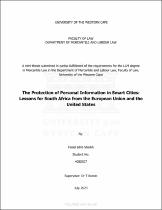| dc.contributor.advisor | Kondo, Tinashe | |
| dc.contributor.author | Sheikh, Faisel Idris | |
| dc.date.accessioned | 2023-11-13T12:40:02Z | |
| dc.date.available | 2023-11-13T12:40:02Z | |
| dc.date.issued | 2023 | |
| dc.identifier.uri | http://hdl.handle.net/11394/10530 | |
| dc.description | Magister Legum - LLM | en_US |
| dc.description.abstract | Innovative technologies are being employed in both public and private sectors alike. Since the beginning of the 21st century, the use of these technologies has grown in both volume and type. E-commerce services have also developed utilising these technologies, complemented by the use of devices such as smartphones, tablets and computers. The integration of these technologies has even moved into homes. Modern technologies are being used to control homes, run appliances, amongst other purposes. Many of the devices in this ecosystem can be connected to the internet. Nowadays, one can switch on their air-conditioning system away from home using a mobile application. The same goes with closed-circuit television systems (CCTV) which can be monitored and controlled remotely using of an application enabled by wireless technologies (for example, WIFI). | en_US |
| dc.language.iso | en | en_US |
| dc.publisher | University of the Western Cape | en_US |
| dc.subject | Artificial Intelligence | en_US |
| dc.subject | Big data | en_US |
| dc.subject | Data protection | en_US |
| dc.subject | Smart cities | en_US |
| dc.subject | Information Communication Technology | en_US |
| dc.title | The protection of personal information in smart cities: lessons for South Africa from the European union and the United States | en_US |
| dc.type | Thesis | en_US |
| dc.rights.holder | University of the Western Cape | en_US |

